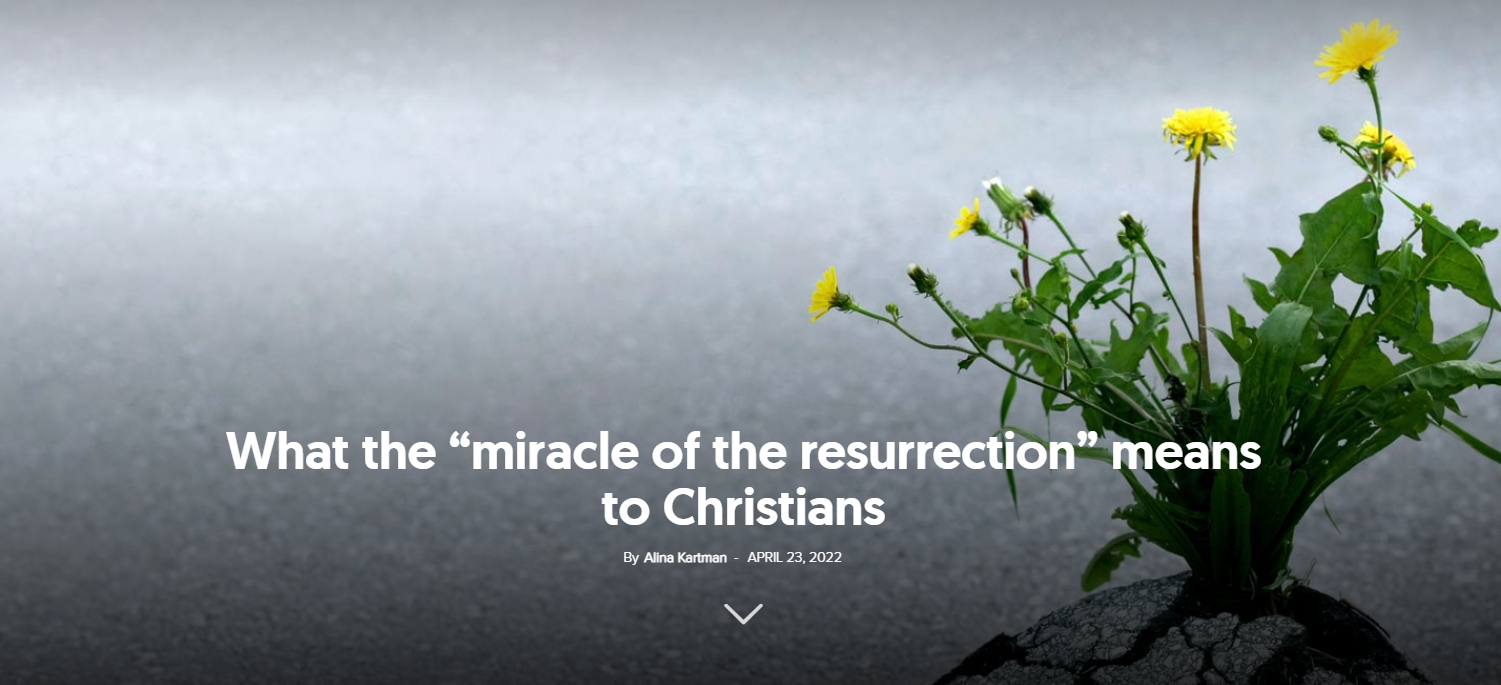In February 2008, English theologian NT Wright made headlines—at least on the website of Time magazine, among others—with comments associated with the launch of his book, Surprised by Hope: Rethinking Heaven, the Resurrection, and the Mission of the Church.
Described by Time as “one of the most formidable figures in the world of Christian thought,” Wright is Bishop of Durham and, as such, the fourth most senior clergyman in the Anglican Church. But his explanations of the Bible’s portrayal of death and heaven have raised eyebrows—and counterarguments—among many traditional Christians.
According to Wright, most Christians have misunderstood and misrepresented the Bible’s portrayals of resurrection, the afterlife and heaven. Building on his previously-published strident arguments for the actual, physical resurrection of Christ, Wright urges that the focus of the New Testament is on our physical, bodily resurrection to live in our recreated, restored and renewed world. He describes this as contrasting starkly with the traditional Christian imagination of disembodied souls floating off to “be with God,” to live eternally in some dreamy, cloud-like existence.
Reflecting on the post-resurrection physicality of Jesus, Wright urges a holistic understanding of human being. Rather than separating body and soul, physical and spiritual, as distinct realms of being—one temporary and disposable, the other eternal—the Bible portrays our lives and living as a hopeful affirmation of everything that is good about being human, created as we are in the image of God.
Working with the exuberant descriptions in Paul’s writings, Wright argues for a larger understanding of the Christian hope of redemption and re-creation—a more hopeful and joyful kind of future: “But thanks be to God! He gives us the victory through our Lord Jesus Christ” (1 Corinthians 15:57).
But Wright is not content to merely be right: “The promise of new creation,” he writes, “is not and cannot be simply about straightening out ideas about life and death.” He urges that a better understanding of death should lead to a better understanding of life, hope and salvation, and how we care for others and our world.
As his subtitle suggests, Wright moves from a renewed understanding of the Bible’s portrayal of death to focus on “the mission of the church”—what should be the focus and what should happen when a group of people who believe in this way work together to put it into practice. “Once we get the resurrection straight, we can and must get mission straight,” says Wright.
As we move in our understanding of salvation from “going to heaven” to “being raised to life in God’s new heaven and new earth,” we begin to work with a significantly different picture of what salvation is. With the realisation that in the resurrection of Jesus a new kind of life has broken into our world, we begin to see this as a reality in which we are invited to participate—and even contribute to—today.
Wright suggests three areas of focus for the church working in this world, in the light of this hope of resurrection: justice, beauty and evangelism.
Justice
God’s concern for justice in the world is one of the great recurring themes of the Bible. Reflecting on the passion of the Old Testament prophets, rabbi Abraham Joshua Heschel contrasts our complacency with their urgent calls for justice: “The things that horrified the prophets are even now daily occurrences all over the world…
We ourselves witness continually acts of injustice, manifestations of hypocrisy, falsehood, outrage, misery, but we rarely grow indignant or overly excited.
To the prophets, even a minor injustice assumes cosmic proportions” (The Prophets). In the biggest of big pictures, the many wrongs in our world and the righting of these wrongs matters.
Wright defines his use of the term justice as “a shorthand for the intention of God, expressed from Genesis to Revelation, to set the whole world right—a plan gloriously fulfilled in Jesus Christ, supremely in his resurrection, and now to be implemented in the world.” If we accept this as a central aspect of God’s work, we will begin to work toward making it a reality in the ways we are able, not because we will set all wrongs right but because working toward God’s goal is the right and godly—in the best sense of the word—thing to do.
In Psalm 146, God is described as the One who “upholds the cause of the oppressed and gives food to the hungry. The Lord sets prisoners free… gives sight to the blind… watches over the alien and sustains the fatherless and the widow” (Psalm 146:7-9). In the promises He offers, God invites us to join with Him in this project and, in doing so, to look forward to His re-creation and re-ordering of our world.
Beauty
In Breath, the most recent novel by Australian writer Tim Winton, one of his characters describes his first glimpse of surfing and compares it with the seeming absence of beauty in the everyday world of Australian masculinity: “I couldn’t have put words to it as a boy, but later I understood what seized my imagination that day. How strange it was to see men do something beautiful. Something pointless and elegant, as though nobody saw or cared… We never spoke about the business of beauty… but for me there was still the outlaw feeling of doing something graceful, as if dancing on water was the best and bravest thing a man could do.”
But, in describing surfing as “pointless and beautiful,” perhaps Winton missed the point of beauty—that in a world created and loved by God, beauty is never pointless. From a creation that was “excellent in every way” (Genesis 1:31, NLT) to the Old Testament poetry that exults in the wonders of the Creator, to Jesus’s pointing to the flowers on the hillside (see Matthew 6:28- 30), beauty is always a glimpse of the power, goodness and love of God, and an awakened appreciation of beauty is a step toward connecting with that reality.
The pointedness of beauty is why Wright insists on beauty as a key component of what the believers in the hope of resurrection should be pursuing in the world.
In an earlier book, he wrote, “The church should reawaken its hunger for beauty at every level. This is essential and urgent. It is essential to Christian living that we should celebrate the goodness of creation, ponder its present brokenness, and, insofar as we can, celebrate in advance the healing of the world, the new creation itself… The arts are not the pretty but irrelevant bits around the border of reality. They are highways into the centre of a reality which cannot be glimpsed, let alone grasped any other way” (Simply Christian).
In our churches and communities, we need to find ways to encourage art in its many forms. We need to make space for our painters and photographers, sculptors and poets, novelists and filmmakers, musicians and storytellers, dancers and actors, scrapbookers, and knitters, designers, and animators. In turn, artists must be serious and joyous, honest but redemptive and hopeful.
But our understanding of beauty also needs to expand beyond the arts to encompass so many others things we easily take for granted. Beauty is also created by our gardeners and cooks, our builders and homemakers, our tree planters and professionals, our carers and counsellors, our surfers and explorers, our mothers and friends.
As human beings, we create in these and so many other ways because God created, continues to create and will recreate a world in which beauty is never pointless: “He has surrounded you with beauty to teach you that you are not placed on earth merely to delve for self, to dig and build, to toil and spin, but to make life bright and joyous and beautiful with the love of Christ” (Ellen White, Thoughts from the Mount of Blessing).
Amid the pain, fears and sorrows of life, perhaps dancing on water—or whatever your creative gift or passion is—is among the best and bravest things a Christian can do.
Evangelism
Evangelism is one of those words that gets many of us ready to cringe, suggesting images of TV preachers and other assorted holy snake-oil salesmen.
But what if evangelism at its best is not about selling you something you don’t want, or making you feel guilty that you don’t see the need for it? What if it was a gracious invitation to join in with the kind of life Jesus had focusing on creating and celebrating justice and beauty in our world today, and in the world God has promised to re-create?
Rather than a cause for guilt, Wright argues that if we can make progress with things like justice and beauty, evangelism will come more naturally.
Indeed, he suggests that “if [a church—a group of hope-filled believers—] is actively involved in seeking justice in the world, both globally and locally, and if it’s cheerfully celebrating God’s good creation and its rescue from corruption in art and music, and if, in addition, its own internal life gives every sign that new creation is indeed happening, generating a new type of community—then suddenly the announcement [evangelism] makes a lot of sense.”
Life matters
Of course, resurrection and the ultimate redemption of creation is the work of God. But because of the reality of Jesus and His resurrection, the promises of God and the hope they give us, the Bible writer Paul assures us that somehow acts of goodness—including justice, beauty and evangelism—done in this life matter and somehow, even contribute to building God’s kingdom in our world, now and in God’s future: “So, my dear brothers and sisters, be strong and steady, always enthusiastic about the Lord’s work, for you know that nothing you do for the Lord is ever useless.” (1 Corinthians 15:58, NLT).
Nathan Brown is an award-winning writer and book editor. He lives in Warburton, Western Australia. A version of this article first appeared on the Signs of the Times Australia website and is republished with permission.




















